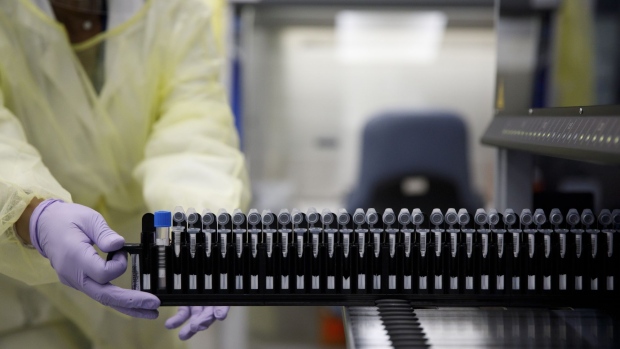Jul 11, 2020
Promising Covid Immunity Shot Stalled, LA Times Reports
, Bloomberg News

(Bloomberg) --
A promising solution to temporarily prevent the coronavirus before a vaccine arrives has faced resistance from the U.S. government and drugmakers, according to an investigation by the Los Angeles Times.
Doctors and experts say an upper-arm shot using the antibody-rich blood plasma of Covid-19 survivors could inoculate people against the virus for months, but federal officials and companies have failed to act, the newspaper said.
Federal officials have twice rejected requests to discuss the proposal and pharmaceutical companies have declined to design or manufacture the shots even as they acknowledge the likely efficacy of the plan, the Times reported. Michael Joyner, a Mayo Clinic researcher who leads a program sponsored by the Food and Drug Administration to capitalize on coronavirus antibodies from Covid-19 survivors called the inaction a “lost opportunity.”
The dispute is over the timing, rather than the promise of the idea, the report says. Federal health officials and industry groups said any plasma-based therapies should focus on treating people who are already sick, not on prevention. Anthony Fauci, director of the National Institute of Allergy and Infectious Diseases, said the idea is an “attractive concept” but scientists need to first prove it’s effective for current patients.
Meanwhile, companies are reluctant to invest in a product that could soon be replaced by a vaccine, advocates for the immunity shots told the Times. Leading plasma companies Grifols SA, Takeda Pharmaceutical Co. and CSL Behring said their efforts are focused on treating patients with serious cases of Covid-19.
“The choice of one delivery method or another has no connection with the potential financial or pricing implications,” a Grifols spokesman told the newspaper.
Some scientists want clinical trials to begin immediately, arguing that the shots offer the only plausible method for preventing millions of infections.
Even a vaccine, when developed, is unlikely to provide lifelong immunity, Fauci said Monday in a video conference hosted by the National Institutes of Health. He expects the public will have an answer before year-end or early 2021 as to whether one of the more than 140 experimental shots in development have been proven safe and effective.
©2020 Bloomberg L.P.